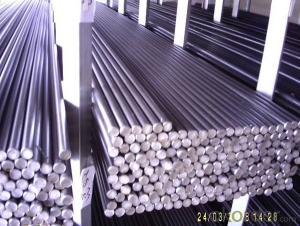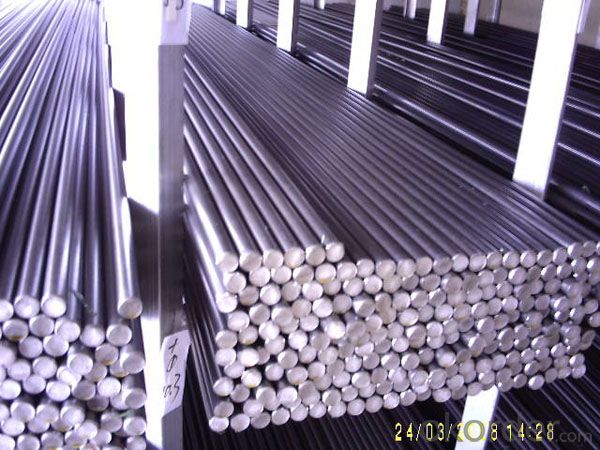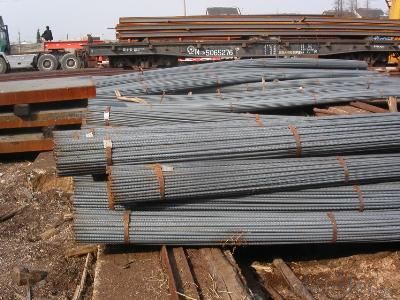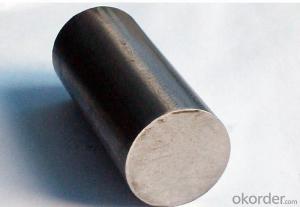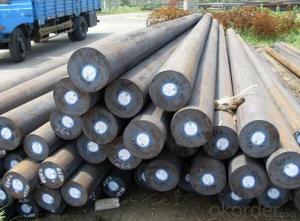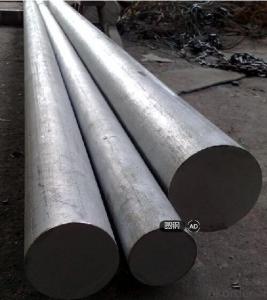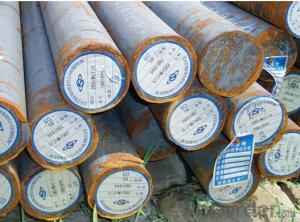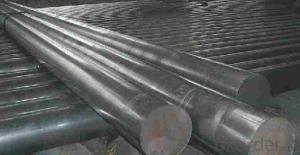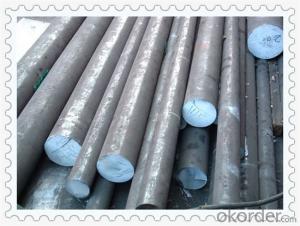Annealed,Hot Rolled&Forged 4130 Alloy Steel Bar
- Loading Port:
- China main port
- Payment Terms:
- TT OR LC
- Min Order Qty:
- 25 m.t.
- Supply Capability:
- 10000 m.t./month
OKorder Service Pledge
OKorder Financial Service
You Might Also Like
Specification
Annealed,Hot Rolled&Forged 4130 Alloy Steel Bar
Material: | AISI 4130 Alloy Steel | |||||||||
Diameter | 6mm ~800mm or at your requirements | |||||||||
Length | 1m~12m or at your requirements | |||||||||
tolerance | a) Diameter: +/-0. 15mm or the others | |||||||||
b) Length:+/-4. 5mm or the others | ||||||||||
surface | black or turned | |||||||||
test | Squash test, Extended test, Water pressure test, Crystal rot test, Heat treatment, NDT. | |||||||||
Mechanical Property | Tensile Strength | ≥ (440~1470) | ||||||||
Yield Strength | ≥(255~1330) | |||||||||
Extension | ≥ (7%~24%) | |||||||||
Reduction of cross-section | ≥ (35%~60%) | |||||||||
Impact absorbing energy | ≥ (31~110) | |||||||||
Hardness (HBS) | ≤ (179~269) | |||||||||
Payment term | T/T L/C or we can negotiate it. | |||||||||
Delivery condition | EAF + LF + VD, hot rolled/forged/ Heat Treatment(optional), | |||||||||
Trade term | FOB/CFR/CIF | |||||||||
Delivery time | have stocks | |||||||||
Packagements | According to customers' requirements or export's demands | |||||||||
Port | Shenzhen/Guangzhou | |||||||||
MOQ | 100 Kilogrammes | |||||||||
Character
| 1,high strength and hardenability 4,good combination property 5,high quality and competitive price. | |||||||||
Application | made into ships, vehicle, aircraft, missile,weapons,railways,bridge,pressure vessel, machine tool,gears in gearbox, gear shaft, cam, worm, claw clutch, etc. | |||||||||
Products | Our products mainly cover special steel,including stainless steel, tool steel, die steel, bearing steel,etc. And in shapes, we provide steel round bar, steel square bar,steel flat bar, steel plate, steel sheet, steel coil, steel wire, ans steel pipe.Being the top-class products in China,our products have been used in all kinds of fields,such as aerospace, electronic information, machine manufacture,petrochemical,automotive,communication, transportation and medical instruments, etc. Our products are sold all over the world , mainly in Asia, South America, and Africa.
| |||||||||
Product show:

Workshop show:

FAQ:
1, Your advantages?
professional products inquiry, products knowledge train (for agents), smooth goods delivery, excellent customer solution proposale
2, Test & Certificate?
SGS test is available, customer inspection before shipping is welcome, third party inspection is no problem
3, Payment Terms?
30% TT as deposit and 70% before delivery.
Irrevocable L/C at sight.
4, Trading Terms?
EXW, FOB, CIF, FFR, CNF
5, After-sale Service?
We provides the services and support you need for every step of our cooperation. We're the business partner you can trust.
For any problem, please kindly contact us at any your convenient time.
We'll reply you in our first priority within 24 hours.
- Q: How are tool steels used in the manufacturing of cutting tools?
- Tool steels are used in the manufacturing of cutting tools due to their excellent hardness, toughness, and wear resistance. These steels are specifically designed to withstand high temperatures, pressures, and repeated impacts during cutting operations. They are used to make various cutting tools like drills, milling cutters, saws, and blades. The high hardness of tool steels allows them to retain their sharpness for longer periods, ensuring efficient cutting performance. Additionally, their toughness helps withstand the mechanical stresses encountered during cutting, while their wear resistance enables them to maintain their cutting edges even after prolonged use. Overall, tool steels are crucial in the manufacturing of cutting tools, enabling precise and efficient material removal processes in various industries.
- Q: How does special steel contribute to the weldability of products?
- Special steel can contribute to the weldability of products by offering enhanced mechanical properties, such as higher tensile strength and improved toughness. This allows for easier manipulation and deformation during the welding process, resulting in more efficient and reliable welds. Additionally, special steels often have controlled chemical compositions, which minimize the presence of impurities and unwanted elements that can negatively impact weld quality. Overall, the use of special steel in manufacturing promotes better weldability, ensuring stronger and more durable products.
- Q: How does special steel perform in cryogenic fatigue resistance?
- The exceptional performance of special steel lies in its ability to resist cryogenic fatigue. Cryogenic fatigue occurs when a material's structural integrity deteriorates under repeated loading and unloading at extremely low temperatures. Special steel, also known as high-performance or high-strength steel, surpasses conventional steels in its resistance to cryogenic fatigue. The enhanced cryogenic fatigue resistance of special steel can be attributed to its distinctive composition and microstructure. Special steels are typically alloyed with elements like nickel, chromium, and molybdenum, which enhance their mechanical properties, including strength and toughness, even at low temperatures. These alloying elements enable the steel to maintain its integrity and resist the initiation and propagation of cracks, which are common failure mechanisms in cryogenic environments. Moreover, the manufacturing process of special steel meticulously controls its microstructure to ensure optimal performance in cryogenic conditions. The fine-grained structure of special steel diminishes the susceptibility to fatigue cracks by promoting a more evenly distributed stress and strain throughout the material. This prevents the formation of localized stress concentrations, which can lead to crack initiation and subsequent failure. Apart from its composition and microstructure, special steel undergoes rigorous testing and quality control measures to guarantee its cryogenic fatigue resistance. Various industry standards and specifications, such as the ASTM E466 test method, exist to evaluate the performance of special steel in cryogenic conditions. These tests simulate the cyclic loading and unloading that the material may encounter in cryogenic environments and provide valuable data on its fatigue life and durability. In conclusion, special steel exhibits exceptional resistance to cryogenic fatigue due to its unique composition, controlled microstructure, and meticulous testing. Its ability to endure repeated loading and unloading at extremely low temperatures makes it the preferred choice for applications in industries like aerospace, energy, and cryogenic storage.
- Q: What are the properties of corrosion-resistant tool steel?
- Corrosion-resistant tool steel possesses several key properties. Firstly, it exhibits excellent resistance to corrosion, which prevents the formation of rust and other forms of deterioration. Additionally, it maintains its strength and hardness even in harsh environments, making it highly durable and long-lasting. This type of tool steel also demonstrates good wear resistance, minimizing the risk of abrasion and extending its lifespan. Finally, corrosion-resistant tool steel can be easily machined and formed, allowing for precise manufacturing processes.
- Q: What are the different heat treatment techniques used for special steel?
- Some of the different heat treatment techniques used for special steel include annealing, tempering, quenching, and case hardening. Annealing is a process that involves heating the steel to a specific temperature and then slowly cooling it to relieve stress and improve its ductility. Tempering is done by reheating the steel to a lower temperature after quenching to reduce brittleness and increase toughness. Quenching is a rapid cooling process that involves immersing the steel in a quenching medium like oil or water to achieve high hardness. Case hardening is a technique that involves adding a hard outer layer to the steel by introducing carbon or nitrogen into its surface and then heat treating it to achieve desired properties. These techniques are used to modify the structure and properties of special steel to meet specific application requirements.
- Q: How does special steel contribute to the manufacturing of bearings?
- Special steel plays a crucial role in the manufacturing of bearings due to its unique properties and characteristics. Bearings are mechanical components that facilitate smooth rotation or movement between two surfaces. Special steel, also known as bearing steel, is specifically designed to meet the demanding requirements of bearing applications. Firstly, special steel offers exceptional hardness, which is crucial for bearings to withstand heavy loads and high-speed rotations. The hardness of the steel allows the bearing to resist wear and deformation, ensuring a longer lifespan and reliable performance. Secondly, special steel possesses excellent corrosion resistance. Bearings often operate in harsh environments where they are exposed to moisture, chemicals, and other corrosive substances. The special steel used in bearing manufacturing effectively prevents rust and deterioration, ensuring the bearings can withstand these challenging conditions. Furthermore, special steel has superior heat resistance and thermal stability. Bearings can generate significant heat during operation due to friction and pressure. The special steel used in their production can withstand high temperatures without losing its structural integrity, preventing premature failure and ensuring consistent performance. Additionally, special steel offers exceptional strength and toughness. These properties are vital for bearings to withstand the intense forces and impacts they experience during operation. The high strength and toughness of the steel prevent fractures, breakages, and other forms of damage, contributing to the overall durability and reliability of the bearings. Lastly, special steel has excellent dimensional stability and machinability. This allows for precise manufacturing and shaping of the bearing components, ensuring accurate dimensions and smooth surfaces. The dimensional stability of the steel ensures that the bearings can maintain their proper fit and alignment within the machinery, minimizing any potential issues or malfunctions. In conclusion, special steel is essential in the manufacturing of bearings due to its hardness, corrosion resistance, heat resistance, strength, toughness, dimensional stability, and machinability. These properties enable bearings to withstand heavy loads, high speeds, harsh environments, and intense forces, ensuring reliable and efficient operation in a wide range of applications.
- Q: What are the specific requirements for special steel used in the nuclear waste storage industry?
- The nuclear waste storage industry has stringent and critical requirements for special steel to guarantee the safety and long-term viability of storage facilities. These requirements are driven primarily by the need to mitigate risks associated with nuclear waste, such as radiation leakage and corrosion. One key requirement is the need for high strength and durability. Special steel used in nuclear waste storage must possess exceptional mechanical properties to withstand the weight and pressure exerted by waste containers and the surrounding environment. This includes resistance to deformation, fracture, and fatigue, as well as the ability to maintain structural integrity for an extended period. Another essential requirement is excellent corrosion resistance. Nuclear waste contains highly corrosive substances that can degrade regular steel over time. Therefore, special steel used in the nuclear waste storage industry must have enhanced corrosion resistance to ensure long-term durability and prevent leakage of radioactive materials. Furthermore, the steel must have a low susceptibility to stress corrosion cracking (SCC). SCC occurs when a combination of tensile stress, corrosive environment, and specific material conditions result in crack initiation and propagation. To maintain the integrity of containers and minimize the risk of leakage, the steel used must be highly resistant to SCC. Radiation resistance is also critical for special steel used in nuclear waste storage. The steel should exhibit minimal degradation or embrittlement when exposed to high levels of radiation. This is necessary to maintain the structural integrity of storage containers and prevent any weakening that could compromise waste containment. In addition, the special steel used in the nuclear waste storage industry must comply with strict regulatory standards and certifications. It must meet specific design codes and guidelines set by regulatory authorities to ensure compliance with safety regulations and minimize potential hazards. In conclusion, the special steel used in the nuclear waste storage industry must meet specific requirements, including high strength, durability, corrosion resistance, low susceptibility to stress corrosion cracking, radiation resistance, and compliance with regulatory standards. These requirements are essential for maintaining the safety and integrity of storage facilities and preventing any leakage or release of radioactive materials into the environment.
- Q: What are the requirements for special steel used in mining equipment?
- The requirements for special steel used in mining equipment are quite stringent due to the demanding nature of the mining industry. Here are some of the key requirements: 1. High strength and toughness: Mining equipment operates in extremely harsh conditions, where it is subjected to heavy loads, impacts, and abrasion. Special steel used in mining equipment must have high strength to withstand these forces and maintain its structural integrity. Additionally, it should possess excellent toughness to prevent fractures and withstand sudden shocks. 2. Corrosion resistance: Mining operations often take place in corrosive environments, such as underground mines or near bodies of water. Special steel used in mining equipment should exhibit high resistance to corrosion and oxidation to ensure its longevity and prevent premature failure. 3. Wear resistance: Mining equipment is exposed to abrasive materials, like rocks and minerals, which can cause significant wear. The special steel used in mining equipment should have excellent wear resistance properties to withstand continuous abrasion and prevent premature wear and tear. 4. Heat resistance: Mining equipment is frequently exposed to high temperatures due to the friction generated during operation or proximity to heat sources. Special steel used in mining equipment should have good heat resistance to maintain its mechanical properties and prevent deformation or structural failure. 5. Fatigue resistance: Mining equipment undergoes repetitive and cyclic loading, which can lead to fatigue failure over time. Special steel used in mining equipment should possess high fatigue resistance to avoid cracking or failure under these cyclic loading conditions. 6. Weldability and machinability: Special steel used in mining equipment should have good weldability and machinability to facilitate the fabrication and assembly processes. This ensures that the equipment can be easily manufactured, repaired, or modified as required. 7. Regulatory compliance: Mining equipment often needs to meet specific regulatory standards and certifications to ensure safety and environmental compliance. Special steel used in mining equipment should adhere to these regulations, ensuring that the equipment is safe to operate and does not pose any environmental hazards. In summary, the requirements for special steel used in mining equipment include high strength and toughness, corrosion resistance, wear resistance, heat resistance, fatigue resistance, weldability and machinability, and compliance with regulatory standards. These requirements ensure that the steel can withstand the harsh conditions and demanding operations encountered in the mining industry.
- Q: What are the main advantages of using special steel in the construction of bridges?
- The main advantages of using special steel in the construction of bridges are its high strength-to-weight ratio, excellent corrosion resistance, and durability. Special steel possesses superior mechanical properties, allowing for the construction of lighter and more efficient bridge structures. It also offers enhanced resistance to environmental factors like moisture, temperature variations, and chemical exposure, leading to longer service life and reduced maintenance costs. Additionally, special steel facilitates the use of innovative and complex bridge designs, enabling architects and engineers to create unique and aesthetically pleasing structures.
- Q: What are the key characteristics to consider when selecting special steel?
- When selecting special steel, key characteristics to consider include the steel's composition, mechanical properties, corrosion resistance, heat resistance, and cost efficiency.
Send your message to us
Annealed,Hot Rolled&Forged 4130 Alloy Steel Bar
- Loading Port:
- China main port
- Payment Terms:
- TT OR LC
- Min Order Qty:
- 25 m.t.
- Supply Capability:
- 10000 m.t./month
OKorder Service Pledge
OKorder Financial Service
Similar products
Hot products
Hot Searches
Related keywords
